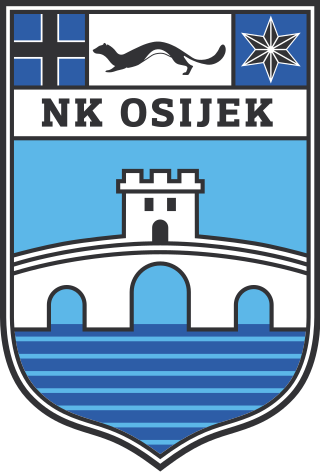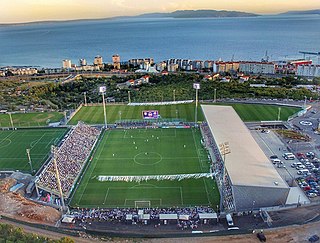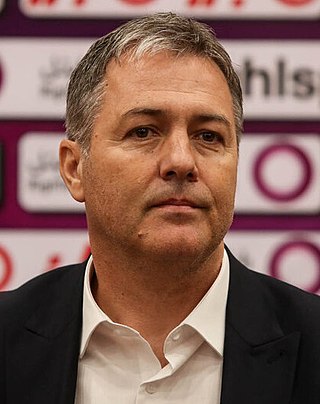
Nogometni klub Osijek, commonly referred to as NK Osijek or simply Osijek, is a Croatian professional football club from Osijek. Founded in 1947, it was the club from Slavonia with the most seasons in the Yugoslav First League and, after the independence of Croatia in 1992, it is one of the four clubs that have never been relegated from the Croatian First League, the others being Dinamo Zagreb, Hajduk Split and Rijeka.

Kantrida Stadium is a football stadium in the Croatian city of Rijeka. It is named after the Kantrida neighbourhood in which it is located, in the western part of the city. It has served as the home of the HNK Rijeka football club for most years since 1946. The stadium has a distinctive appearance as it is situated between steep cliffs, a remnant of an old quarry, just north of the stadium and the shore of the Adriatic on its south side.

Gradski vrt Stadium is a multi-use stadium in Osijek, Croatia. It is located in the Gradski vrt neighbourhood in Novi grad city district. With a capacity of 17,061, it has been the home ground of two Croatian football clubs, NK Osijek and Fortuna VNO Osijek.

Stadion u Kranjčevićevoj ulici, also known as Stadion Concordije between 1921 and 1945, is a multi-purpose stadium located in Trešnjevka neighbourhood, in the Croatian capital of Zagreb. It is mainly used for football matches and was historically the home ground of NK Zagreb until their eviction from the ground in 2018. More recently the stadium has been the home ground for Croatian First League side NK Lokomotiva. In addition, NK Rudeš use the stadium for selected matches, particularly Croatian First League games. First opened in 1921, it has undergone many renovations and facelifts, with its current layout dating back to the 1987 Summer Universiade renovation. The Croatia national football team played only once at the stadium in a 3–0 friendly game win against South Korea on 13 March 1996. With its reduced capacity from 2008, the stadium can hold 8,850 people, which makes it the second biggest stadium in Zagreb, behind Stadion Maksimir. In 2018, the stadium was refurbished with chairs installed in the eastern grandstand and a new hybrid lawn installed, leaving it with a seating capacity of 5,350 seats.

Stadion Rujevica is a stadium in the city of Rijeka, Croatia. The stadium is commonly referred to as Rujevica after its location. From August 2015, the stadium is a temporary home ground for HNK Rijeka during construction of the new Stadion Kantrida. The stadium is part of the training camp used by the club's youth academy, which includes four additional fields. Once the new Kantrida is built, the stadium will be used as the club's training ground.

Dragan Skočić is a Croatian professional football manager and former player.
Alen Petrović is a Croatian former football defender and sporting director.
Ante Erceg is a Croatian professional footballer who plays as a forward for Croatian Football League club Istra 1961.

Ante Čačić is a Croatian professional football manager who is the current head coach of Croatian Football League club Dinamo Zagreb.

Građanski nogometni klub Dinamo Zagreb, commonly referred to as GNK Dinamo Zagreb or simply Dinamo Zagreb, is a Croatian professional football club based in Zagreb. Dinamo play their home matches at Stadion Maksimir. They are the most successful club in Croatian football, having won twenty-three Prva HNL titles, sixteen Croatian Cups, six Croatian Super Cups, and one Inter-Cities Fairs Cup. The club has spent its entire existence in top flight, having been members of the Yugoslav First League from 1946 to 1991, and then the Prva HNL since its foundation in 1993.

Mijo Caktaš is a Croatian professional footballer who plays as an attacking midfielder for NK Osijek in Prva HNL.
The Football Oscar is an annual football award given by the Croatian Association Football Union and Sportske novosti since 2013. In the 2017 edition the award was renamed as Trophy Footballer. It is awarded to the best football player, manager and goalkeeper playing in the Croatian First League. Also, it is awarded to the best overall Croatian player at the end of every season. The best 11 Prva HNL players of the season are also selected. The award is chosen by players and managers of the Croatian league clubs.

Kristijan Jakić is a Croatian professional footballer who plays as a defensive midfielder for Bundesliga club Eintracht Frankfurt and the Croatia national team.
The 2020–21 Croatian First Football League was the 30th season of the Croatian First Football League, the top national championship for men's association football teams in Croatia, since its establishment in 1992. The season started on 14 August 2020 and finished on 22 May 2021.
Events in the year 2021 in Croatia.
The 2021–22 Croatian First Football League was the 31st season of the Croatian First Football League, the national championship for men's association football teams in Croatia, since its establishment in 1992. Contested by 10 teams, the season started on 16 July 2021 and ended on 21 May 2022. Dinamo Zagreb, the defending champions, successfully defended their title.
The 2021–22 season was the 111th season in the existence of GNK Dinamo Zagreb and the club's 31st consecutive season in the top flight of Croatian football. In addition to the domestic league, Dinamo Zagreb participated in this season's editions of the Croatian Cup, the UEFA Champions League and the UEFA Europa League.
The 2022–23 season is the 112th season in the existence of GNK Dinamo Zagreb and the club's 32nd consecutive season in the top flight of Croatian football. In addition to the domestic league, Dinamo Zagreb is participating in this season's editions of the Croatian Cup and the UEFA Champions League.





























